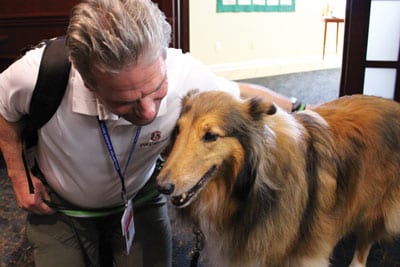Published on September 1, 2017

“She’s been such a gift. My own sense is when you have a gift like this, especially a gift like this, you share it. She’s just been a treasure, a gift to share over and over again.”
Pet therapy (also known as “animal-assisted activities”) is one of the most beloved parts of our volunteer program. You might say it’s the warmest and fuzziest aspect of Alive, and it’s not hard to see why!
We have nine four-legged volunteers who visit Alive patients and their loved ones each week, bringing joy and a little puppy love to all they encounter.
“Pet visits are a good diversion from the stress of any situation,” said Renee Wisby, Alive’s director of volunteer services. “This is true for patients, their caregivers, visitors and our staff members as well. A person who is open to a pet visit usually appreciates the unconditional love that the animal gives them at that moment.”
Wisby sees these interactions as beneficial for both the patient AND the pet therapy animal.
“Therapy pets seem to be so intuitive and gentle. I always see their interactions as a two-way street as they lay their paw or their head gently on the side of the bed seeking attention, yet giving attention and love to the individual with this same action,” she said.
Pet therapy animals have to complete some important steps and meet certain requirements before they can begin making visits.
Namely, our pet therapy animals’ two-legged human companions have to complete training with Alive and their pets have to complete the certification process through organizations such as Pet Partners and Therapy Dogs International, so we know they have what it takes to visit those in our care. They must be clean, well groomed, and current on their vaccinations.
If you’re interested in becoming a pet therapy volunteer, read the following Q&A to learn more, and then call us at 615-327-1085.
Q&A with Alive’s Pet Therapy Volunteers
The following information is excerpted from a recent Lunch and Learn, which introduced several of our canine volunteers and their human companions who volunteer with Alive.
Q: How do you recognize whether your pet is appropriate to be a pet therapy animal?
David Andrzejewski and Nova: Nova and I got acquainted about five years ago and I adopted her from a rescue shelter. I guess it just more or less evolved. She got to know me better, I got to know her better. This might seem strange to people who aren’t too much into animals, but she’s always wanted to do this. We did the training and went through the preliminary evaluations. We were blessed to get a very good rating and we completed the training.
She’s been such a gift. My own sense is when you have a gift like this, especially a gift like this, you share it. She’s just been a treasure, a gift to share over and over again.
Christy Biles and Sophie: I took Sophie to a nursing home when she was 8 weeks old. She was less than a pound and fit in the palm of your hand. She made eye contact with everybody and was very calm and happy to interact with everybody. When the oxygen machine made strange noises when it went on and off, she was pretty “chill” about it. I thought that was a good sign for her future as a pet therapy dog.
Jim & Lee Holzemer and Rafe: I think one of the things that I see in other dogs and certainly with Rafe is just that essence of presence. I find that in hospital chaplaincy-type work – I think Rafe indeed helps me be a better minister (because of the cues I take from him).
Q: How do you go about having your dog certified as a pet therapy animal?
Joy Nielsen, Volunteer Coordinator (and former pet therapy volunteer): There are organizations that certify therapy animals. Each one is a little bit different in how that is accomplished and done.
Most normally, at least with dogs, they need to first have the American Kennel Club (AKC) Canine Good Citizen certification. You can do that almost anywhere (such as many pet supply stores). That’s good for everybody to do with their dogs, I think, whether they become pet therapy animals or not. From there, there are classes you take. Therapy ARC does certification.
So much of it is training of the human handler and what to watch for and how to get your dog to respond to you and things of that nature. You want to make sure your pet is insured. We want to know you’ve gone through this training and we want to know that we are getting a good handler and a really good pet. We determined six or seven years ago that we needed to have that kind of certification, so going forward now, all of our pets are certified.
